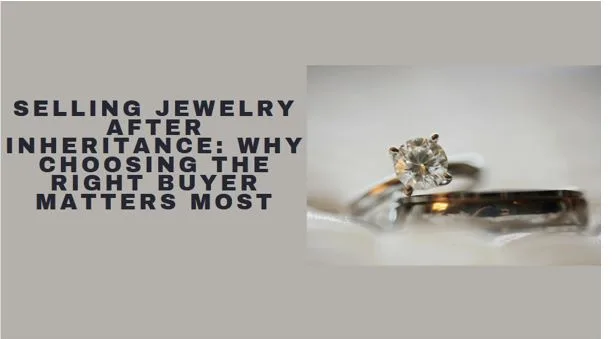Selling Jewelry After Inheritance: Why Choosing The Right Buyer Matters Most
Inheriting jewelry often has a deeply touching effect. They are not just diamonds, silver, or gold. They are family heritage and memories. A ring will remind you of your grandmother’s warm hands. A bracelet will remind you of your mother’s laughter. Each piece connects you with the individual that you loved and the memories that matter.
But with that comes responsibility, as well. There are sometimes more pieces than you can wear or stash. Sometimes relatives have to cut the collection in half. You may even opt to sell some pieces, allowing them to take on new meaning or play a role in another person’s life.
It’s not just about price when you’re selling estate jewelry. It’s about respect, trust, and selling it to someone who will appreciate the sentimental worth of each piece. The individual you sell to must treat your jewelry with the same respect that it was treated in your family. That choice can make or break your entire experience and how you feel selling it.
This article examines why selecting the right buyer is the most crucial factor in selling inherited jewelry.
1. Right Buyer Respects The Meaning Behind Each Piece
When you sell an item that was owned by a person you loved, the feelings will always come with it. Respect must come first, therefore. You are not selling something; you are letting go of something precious to you on a personal level.
A good jewelry buyer knows this. They listen, answer your questions, and handle every piece with care. Besides, they do not rush you or attempt to pressure you into a purchase. Instead, they handle your jewelry with patience and care, knowing that each piece has a unique history attached to it.
Respect is also apparent in communication between a buyer and a seller. If they explain each step and make sure you are okay, it means they respect you just as much as the jewelry. Selling heirlooms can be a very personal experience, but having someone nice and understanding to assist makes it feel as if you are doing your loved one justice.
2. Fair Value Comes From Honest Evaluation
Jewelry’s true value is not always so obvious. At times, the small plain thing may be worth more than the supposedly larger or more elaborate one. That is why honesty and experience are essential in arriving at its true value.
So, a good buyer will take a seat and explain to you how they arrive at their offer. They thoroughly examine the metal content, the quality of the gemstone, the setting, and the overall condition in great detail. Instead of spit-balling out a quick figure, they explain the details to you so you understand exactly how your jewelry is priced in the market today.
3. Safety Gives You Confidence To Move Forward
Inherited jewelry holds both financial and sentimental value, making security a crucial aspect of the sale itself. You must ensure that your pieces are protected during the process, and that begins with finding the right buyer.
Remember, a professional buyer understands the value of that sense of security. Once your jewelry leaves your hands, they make sure it is completely insured and carefully tracked.
If you prefer to send them by mail, they provide you with insured labels and regular check-ins so that you know where they are at all times. If, however, you’d prefer an in-home visit, they maintain secure, private offices where your pieces can be safely appraised.
Safety is not only protection from loss or damage; it’s also how you feel along the way. A buyer should never leave you wondering or rushing to make a decision. They should communicate clearly, inform you about what they are doing, and ensure you remain in charge throughout.
4. Experience Leads To Accurate Offers
Inherited jewelry consists of older items, antique pieces, or family treasures that may be difficult to price. Not everyone understands how to value them correctly, and that is why experience is valuable.
An experienced buyer will see value in things that a different individual won’t. They will feel the legacy of an older cut diamond, the amazing craftsmanship of a hand-designed setting, and the legacy of an unusual design. They understand how to identify unusual gems and what resellers and collectors are looking for.
With this knowledge, they are then able to make bids that properly consider the material and artistic value of each item. An inexperienced purchaser, however, may consider only the weight of the gold or the size of the gemstone, rather than the internal value that comes from design and craftsmanship.
5. Simplicity Makes The Process Easier
It doesn’t have to be difficult to sell inherited jewelry. The best buyers understand that it’s better in simple ways. They guide you through every step, keeping things basic and easy to understand.
The process usually begins with posting details or pictures of your items. A reliable buyer provides an instant free quote. If you’re okay with it, you can ship the jewelry securely or meet up and conduct a physical evaluation. They check it out and then send you a final quote.
If you accept, payment is normally paid immediately. If you do not sell, your jewelry is returned to you safely at no cost. It is all simple, nothing to read between the lines.
Final Thought
Selling jewelry after an inheritance is an emotional decision, but also a good one. Each item holds a story behind it, and selling to the right individual allows that story to continue with integrity and respect.
The person you choose to sell to must give you more than money. They must give you respect, honesty, safety, and experience. These are crucial because they protect your peace of mind as well as your jewelry.




